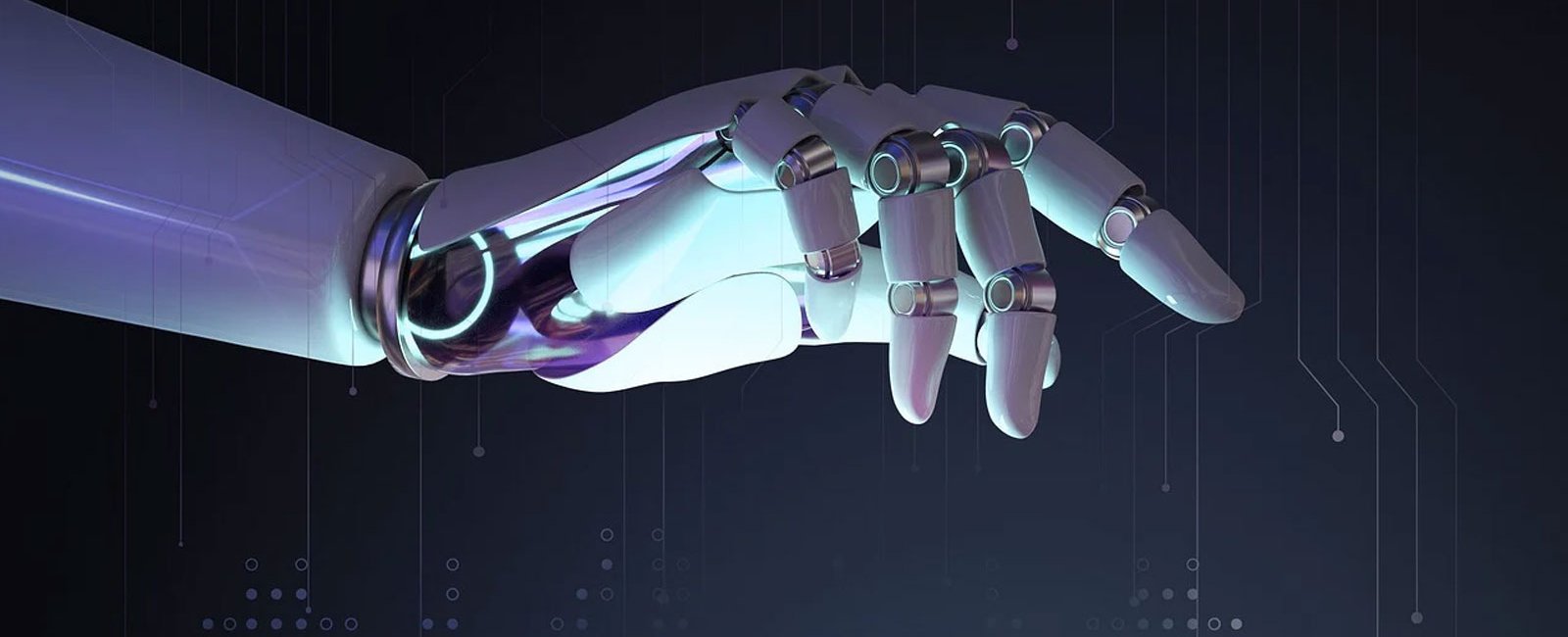Bioniks: How a Pakistani startup is giving new lives to amputees with intelligent artificial limbs
There are around 65 million amputees in the world, and approximately 1.5 million people undergo surgical removal of a limb each year

It was the ominous morning of October 23, 2013, when Raqeeb Jamil, a seven-year-old resident of Neelum Valley in Azad Jammu Kashmir near the Line of Control (LoC), ran into an otherwise innocent-looking but deadly booby trap, while on his way to school from his home.
En route, he found a plastic toy bomb which exploded as he touched it. As a result, he lost both his hands and fractured his right leg.
After the installation of mechanical prosthetic arms the following year, Raqeeb had to live in this condition for the next decade in Muzaffarabad.
This month, Raqeeb received his first-ever pair of artificial intelligence-powered prosthetic arms at Karachi’s Bioniks – over 1,500 kilometres away from his native area. Raqeeb, now 18, is a first-year intermediate student in Muzaffarabad.
“There is a lot of difference between the usage of mechanical and AI-run limbs. With AI prosthetic arms, I can perform multiple actions of daily life which were missing with the mechanical pair. However, I need more practice with the new pair of artificial limbs,” he told Geo.tv.
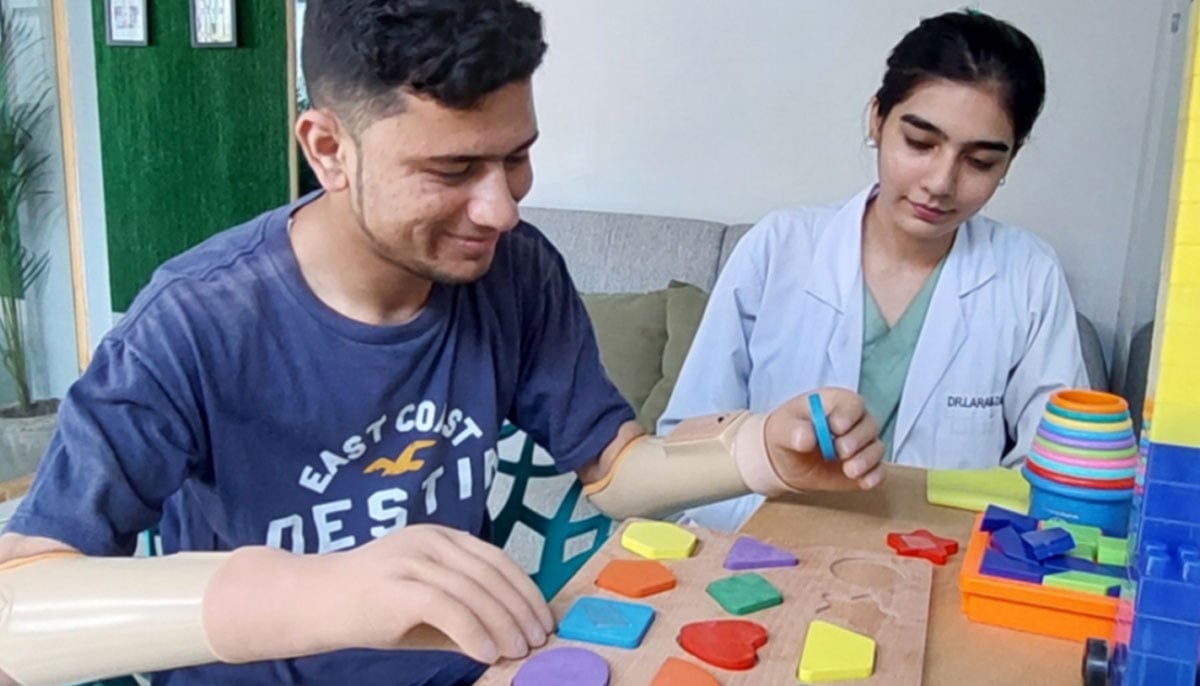
“The new pair of artificial intelligence-run limbs were donated to Raqeeb by the First Lady of Pakistan Samina Alvi,” said Anas Niaz, Chief Executive Officer and co-founder at Bioniks, while talking to Geo.tv.
Like Raqeeb, a farming lady, Allah Bachai from Balochistan province is another recipient of AI-run artificial limbs from Bioniks.
Bachai, a 26-year-old housewife from a remote village in Balochistan’s Sohbatpur District, had both her arms accidentally amputated while cutting grass for her livestock in the year 2021.
At the time of amputation, Bachai was pregnant and a mother of three. Later, she gave birth to her fourth child.
After giving birth to her child, the family learned about Bioniks through a social media video, which convinced them to contact the organisation to have her arms fitted with AI-supported prosthetic limbs.
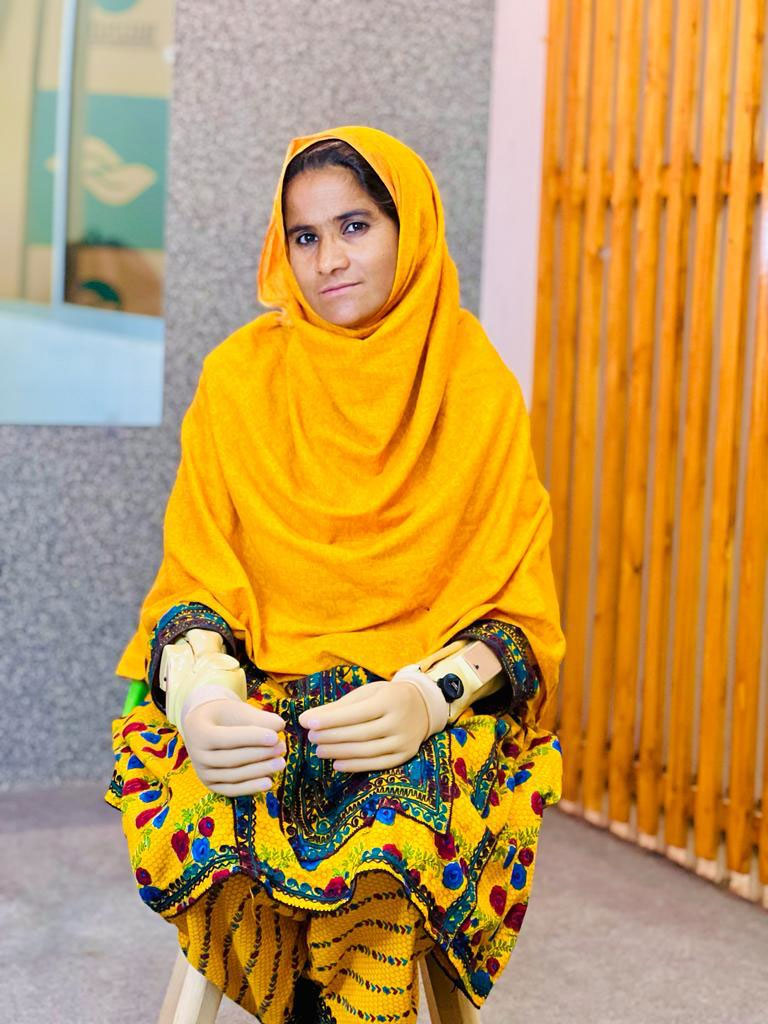
With her new AI-supported prosthetic limbs, she can now perform her daily chores.
"The first thing Bachai asked during the fixation of AI prosthetic arms was whether she could take care of her newborn baby or not,” Anas added.
“With the help of prosthetic arms, I take care of my newborn and the rest of the family in addition to performing daily tasks," Bachai told Geo.tv.
Innovation and philanthropy go together
An AI-driven prosthetic arm is an advanced limb replacement using AI technology for natural movement and sensory feedback. Sensors inside the arm capture signals from the user's nerves, enabling seamless motion.
The user wears a data glove on their existing hand and performs repeated hand movements on both arms. The glove records the intended movement, while a nerve interface records signals from the missing arm, helping to train the prosthetic.
Bioniks is an AI-driven prosthetic arms innovation made by a group of young technologists in Karachi. The outlet not only delivers AI-driven prosthetic arms to individuals in Pakistan but also abroad.
It started in 2016 when two classmates, Anas Niaz and Ovais H. Qureshi, joined hands while they were studying mechatronic engineering.
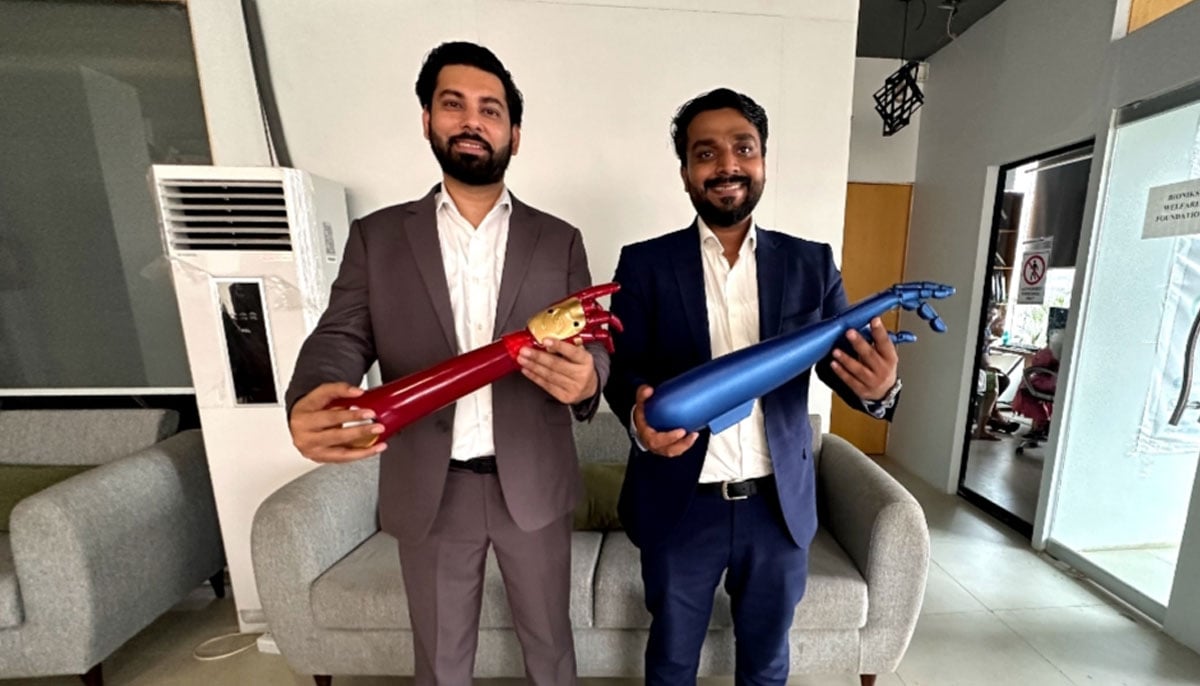
“Formation of Bioniks and AI-run prosthetic arms were not planned. It all started when the parents of 5-year-old boy Mir Biyyaan Baloch who was born with a congenital limb defect approached us to make a prosthetic for him,” Anas added.
Later in 2018, they completed their graduation in mechatronic engineering from Shaheed Zulfikar Ali Bhutto Institute of Science and Technology (SZABIST) Karachi. Bioniks' staff has reached 30 now.
“Bioniks AI-driven prosthetic devices are certified for ISO 9001; ISO 13485; and CE marking for medical appliances,” Ovais H. Qureshi, another co-founder of Bioniks added.
According to Ovais, the cost of Bioniks' prosthetic arm is 10 times lower than that of any advanced bionic arm available worldwide. A bionic arm made elsewhere costs $15,000 and can go up to $50,000, whereas the Bioniks-made bionic arm costs less than 2,000 USD.
“The bionic arm that we offer has the same level of quality but includes more features, such as running through the AI Bioniks mobile application, which helps users improve the functionality of their arm through machine learning. We are able to troubleshoot remotely, so our users don’t have to come all the way to our clinics for minor maintenance. Additionally, and most importantly, our sensors are waterproof and sweatproof, allowing our users to use our products in all types of extreme climates,” he said.
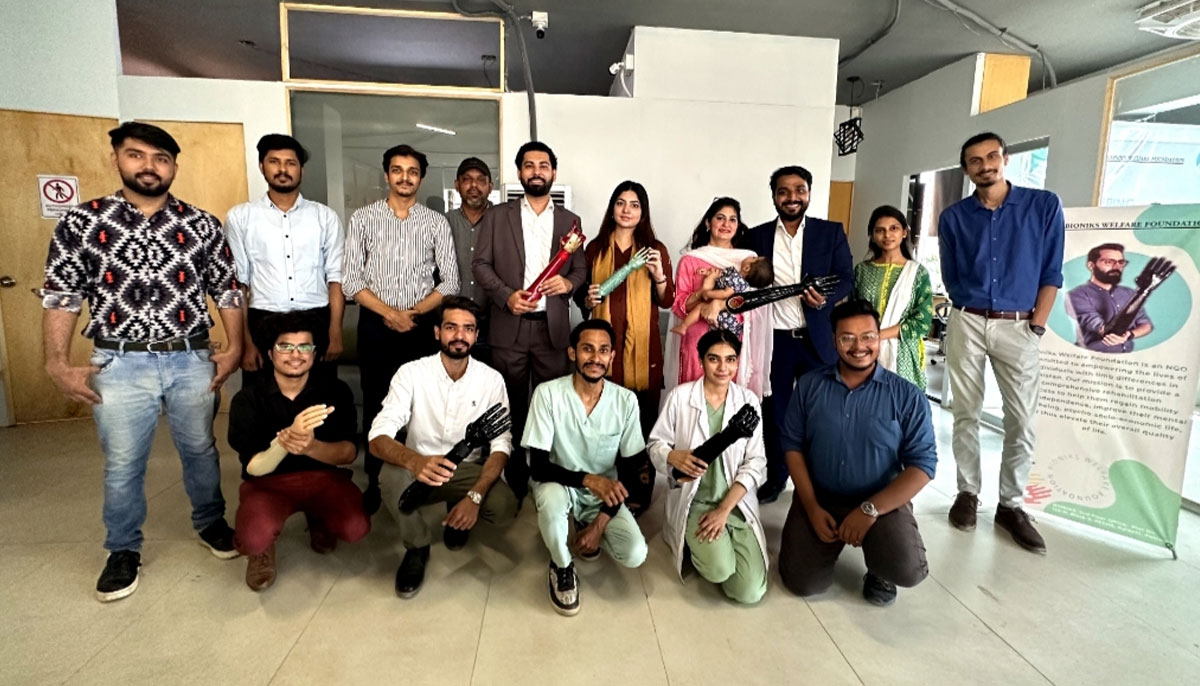
The majority of the AI prosthetic arms provided by Bioniks are provided free of cost to the receivers under philanthropy, according to Ovais.
"Since the start, we have made and installed 600 AI-run prosthetic arms devices for the affected people, out of which, 80% are provided with the devices free of cost for those who are unable to afford them,” Ovais said.
Bioniks conducts fundraising for people who are unable to acquire a functional bionic arm through its Bioniks Welfare Foundation. It's not just Pakistan; Bioniks also supplied AI-powered limbs to individuals from various other countries.
"We've helped six people from different places - three from Saudi Arabia, two from Afghanistan, and one from the United Arab Emirates. They all came to Karachi for treatment because our new scanning feature wasn't available yet. Bionic arms are very costly in the Gulf because they have to be brought in from Europe or the USA," explained Anas.
Governments partner with Bioniks
Provincial governments also ordered Bioniks some AI-run limb devices so that they can be distributed among the people.
The Sindh government recently purchased 50 bionic arms from Bioniks to provide free arms to the people of the province. Before that, the government was providing imported cosmetic hands.
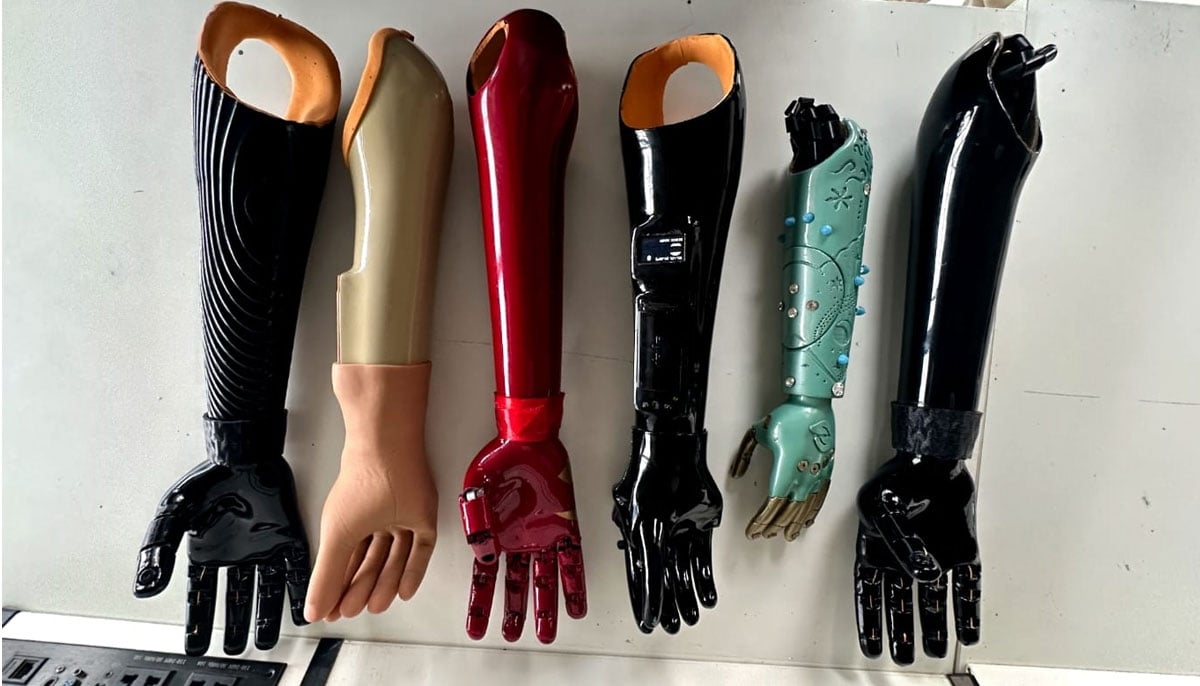
According to Ovais, the Pakistan Institute of Prosthetic and Orthotics (PIPOS) in Khyber Pakhtunkhwa province also signed a memorandum of understanding (MOU) with Bioniks to purchase 100 arms for mostly terrorism-related victims.
Addressing limb prosthetic needs
Since the start, Bioniks has fixed 600 AI-run prosthetic arms. Yet 1,000 are still waiting.
A Bioniks survey based on people waiting for limb devices says that out of the total, 74% are males, 15% are females, and 10% are children under the age of 12, while the rest are miscellaneous.
Similarly, according to Bioniks' survey, 22.9% of people were amputated while cutting grass, 18.6% because of electrocution, 17.2% were congenital, and 17% lost their limbs due to road accidents.
It is estimated that globally 65 million people live with limb amputations, and approximately 1.5 million individuals undergo surgical removal of a limb each year.
Bioniks is a social enterprise. Since Bioniks-manufactured AI prosthetic limbs are cheap, our future vision is to manufacture limbs so that we can supply them to the rest of the world, especially to poorer countries, Anas added.
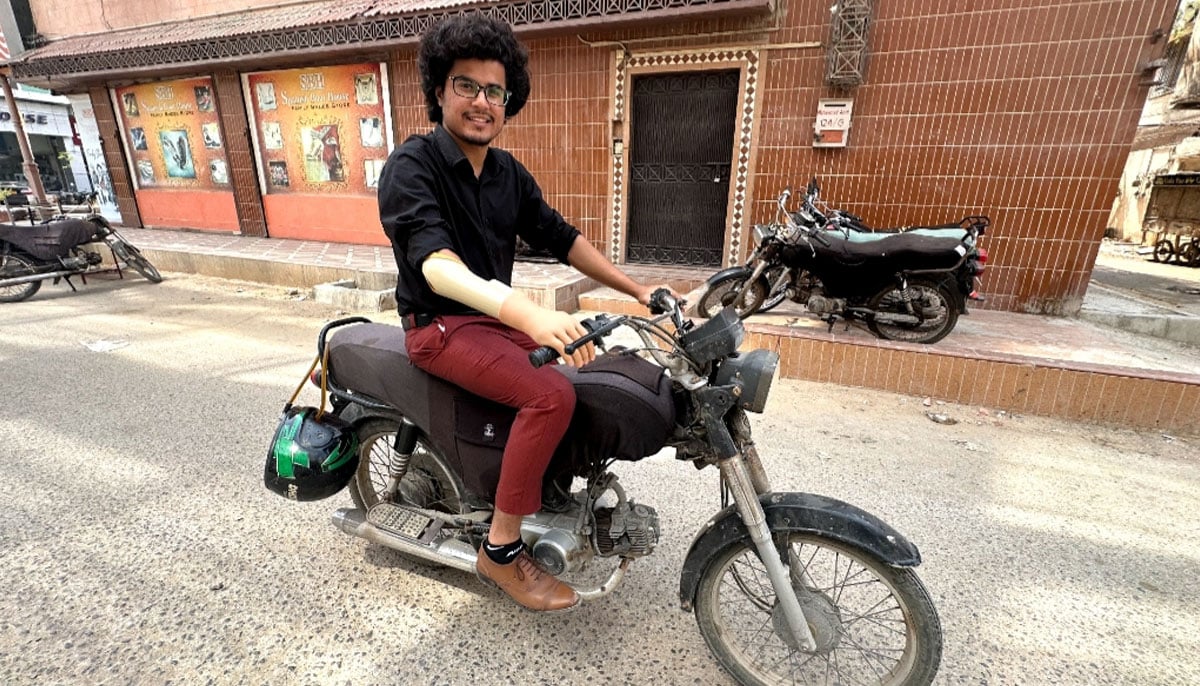
For the 23-year-old Karachiite Muhammad Hamza Khan, who was born without his right hand, performing chores has become 80% possible after the installation of an AI-run-limb one and a half years ago. However, he calls for more donations so that every affected person can get the device.
“I can drive a bike and a car. I can fulfil 80% of my daily chores easily. I hope steps should be taken by society to make sure that every affected person gets the AI limb device, as it brings a lot of difference and ease in life,” he added.
Zulfiqar Kunbhar is a Karachi-based, freelance environmental journalist. He posts @zulfiqarkunbhar
— Header and thumbnail image by Unsplash



